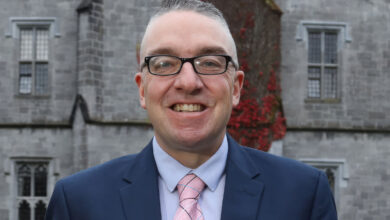New evidence shows it is past time to tackle epidemic of sexual violence in Ireland

With new official statistics highlighting that 40 per cent of adults in Ireland experience sexual violence in their lifetime, Noeline Blackwell, Chief Executive Officer of Dublin Rape Crisis Centre, says more needs to be done to tackle an epidemic of sexual violence.
Half of women in Ireland. A quarter of men. Overall, 40 percent of Irish people.
Small wonder that this was the standout statistic from a new survey on the prevalence of sexual violence in Ireland published by the Central Statistics Office (CSO) on 20 April. Five further more detailed reports will issue over the next three months.
This is the first time that the CSO has undertaken this survey, but it is not the first of its kind. In 2002, Dublin Rape Crisis Centre (DRCC) commissioned research carried out by Hannah McGee and her team at the Royal College of Surgeons in Ireland which became known as the SAVI report. McGee has pointed out that the findings of the two surveys are not dissimilar. Together, they reveal an endemic, disturbing and worryingly high prevalence of sexual violence in Ireland.
This CSO report shows that a third of adults surveyed experienced sexual violence as a child, and a quarter as adults. Women reported higher levels of sexual violence than men, with four times as many women experiencing non-consensual sexual intercourse over their lifetime. Women aged 25-34 reported the highest levels across all adult sexual violence types.
Echoing the SAVI report, and DRCC’s own data over years, this survey notes that most adults (78 per cent) who experienced sexual violence knew the perpetrator. About half of adults (47 per cent) who experienced sexual violence in their lifetime told someone about it Women (53 per cent) were more likely to disclose than men (34 per cent) but in general, those surveyed were more likely to disclose it if the experience was with a non-partner-only (55 per cent) than with a partner-only (16 per cent).
Younger people were more likely to have experience of sexual violence in their lifetime, with two-thirds of women aged 18-24 and 40 per cent of men in that age group disclosing an incident.
The information is shocking but not surprising. Far too many people experience sexual violence, which the CSO defines as a range of non-consensual experiences, from non-contact experiences to non-consensual sexual intercourse. The survey recognises that the ‘violence’ involved includes force but also sexual mis-behaviour or activity which has a marked or profound effect on someone.
While the 2023 and 2002 surveys have broadly similar findings, the new survey is, as the CSO says, a landmark in many ways, not least because it the first time a state agency has undertaken it with the promise to repeat it. This is a sensitive topic and it can be difficult to elicit solid information. Much time and thought went into it, including consultation with survivors of sexual violence known to DRCC.
Some answers may indicate increased understanding among younger people of what has happened to them when they experienced sexual violence. There is also hope in the finding that while 14 per cent of respondents over 65 had experienced sexual violence by someone in authority, only 1 per cent of those aged between 18 and 24 had. It is likely that better procedures in schools, sports clubs, and the like have contributed to that.
So positive change is possible. It is also essential. Far too many people continue to be harmed by sexual violence and our health and justice systems are changing too slowly for people. The evidence is now incontrovertible. As acknowledged in the Programme for Government, we have an epidemic of sexual violence – one that does immeasurable harm to too many people, who suffer in silence; one that assaults dignity and denies equality. It will take work, time, and thought to bring this epidemic to an end. But it will certainly be worth it to create a healthier, safer Ireland.
Noeline Blackwell is Chief Executive Officer of Dublin Rape Crisis Centre.





